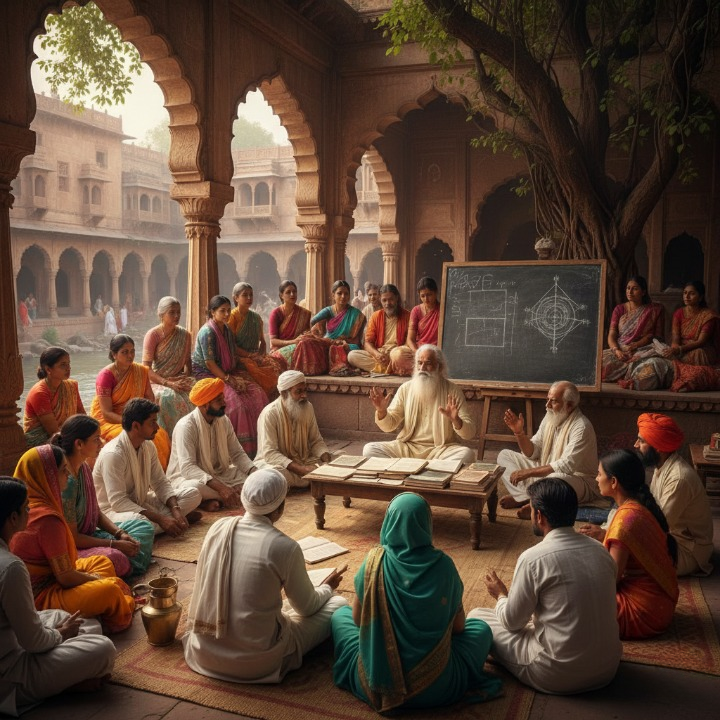
The Role of Community in Shaping Philosophical Thought in Uttar Pradesh
- admin
- October 8, 2025
- People, Uttar Pradesh
- 0 Comments
How Collective Identity Drives Cultural and Ethical Narratives in India’s Heartland
Lucknow – Uttar Pradesh, often regarded as the cultural and philosophical epicenter of India, owes much of its intellectual heritage to its communities. From rural villages to urban centers, the state thrives on a collective consciousness that shapes its cultural, social, and philosophical outlook. The role of communities in defining these narratives has been pivotal, influencing not only individual beliefs but also broader societal norms.
A Rich Tapestry of Collective Influence
Rural Panchayats and Traditional Wisdom
The rural heartland of Uttar Pradesh remains deeply rooted in its collective decision-making structures, such as panchayats, which continue to influence local philosophy and ethics.
- Moral Philosophy: Panchayats often resolve disputes by drawing on centuries-old traditions, reinforcing ideals of justice and community welfare.
- Challenges: Critics argue that caste and gender biases within these structures often hinder equitable decision-making.
Urban Centers: Modernity Meets Tradition
Cities like Lucknow, Kanpur, and Varanasi have become melting pots of ideas, where traditional values meet modern philosophical thought.
- Cultural Adaptations: Urban communities often integrate global perspectives with local ethics, as seen in the growing popularity of events like Ganga Mahotsav in Varanasi, which blends traditional spirituality with modern sustainability dialogues.
Key Factors Driving Community Philosophy
1. Caste Dynamics
Caste plays a central role in shaping community values and philosophies in Uttar Pradesh.
- Data Insight: According to the 2011 Census, Scheduled Castes constitute nearly 21% of UP’s population, influencing grassroots movements advocating for equality and social reform.
- Impact: Movements led by Dalit leaders like Kanshi Ram and Mayawati have challenged traditional hierarchies, embedding Ambedkarite principles of justice and empowerment in the state’s collective consciousness.
2. Religious Syncretism
Uttar Pradesh’s communities exemplify the Ganga-Jamuni tehzeeb, a harmonious blend of Hindu and Muslim traditions.
- Cultural Icons: Festivals like Holi and Eid are celebrated across religious boundaries, reinforcing ideas of unity and coexistence.
- Philosophical Impact: This syncretism has inspired literary and artistic works, from the poetry of Kabir to the architectural legacy of Lucknow’s Bara Imambara.
3. Economic Cooperation
Programs like One District, One Product (ODOP) highlight how communities leverage collective skills to preserve traditional crafts and boost economic growth.
- Example: The brassware industry in Moradabad thrives on cooperative efforts, reflecting philosophies of shared labor and mutual benefit.
Modern Influences on Community Thought
1. Education and Digital Connectivity
- Changing Narratives: With the rise of digital literacy programs and educational initiatives, communities are increasingly exposed to global ideas, reshaping traditional philosophies.
- Digi Shakti Mission: Over 50 lakh tablets and smartphones distributed to students in UP have enabled greater access to information.
- Outcome: Youth in rural and urban areas are now participating in global conversations while retaining local values.
2. Political Mobilization
- Grassroots Movements: Political parties in Uttar Pradesh have consistently relied on community mobilization, reflecting shared aspirations and philosophies.
- Example: The Samajwadi Party and BSP have historically championed community-driven philosophies focused on caste equality and social welfare.
3. Urbanization and Migration
- Impact: As people migrate to urban areas for opportunities, they bring their community philosophies with them, creating a mosaic of ideas in cities.
- Challenges: Urbanization often leads to the dilution of traditional practices, raising concerns about cultural preservation.
Community-Led Initiatives Shaping Thought
1. Reviving Traditional Wisdom
- Case Study: The revival of water conservation methods in Bundelkhand, led by local communities, reflects a return to ecological philosophies rooted in sustainability.
2. Women’s Empowerment Movements
- Example: Self-help groups (SHGs) in rural UP have empowered women to challenge traditional gender roles, fostering philosophies of independence and equality.
3. Spiritual Gatherings
- Events like the Kumbh Mela bring together millions, creating a collective spiritual consciousness that reinforces moral and ethical philosophies.
The Path Forward: Balancing Tradition and Progress
While communities in Uttar Pradesh continue to shape philosophical thought, the state faces challenges in balancing traditional values with modern demands.
Recommendations
- Promote Cultural Education: Introduce programs that teach younger generations about the philosophical and cultural contributions of their communities.
- Encourage Interfaith Dialogues: Build platforms to strengthen the Ganga-Jamuni tehzeeb, emphasizing unity amidst diversity.
- Leverage Technology: Use digital tools to preserve oral traditions and folk philosophies, ensuring their relevance in modern contexts.
- Strengthen Grassroots Governance: Empower panchayats and SHGs to lead initiatives that integrate traditional wisdom with modern practices.
Conclusion: The Collective Spirit of Uttar Pradesh
The role of community in shaping philosophical thought in Uttar Pradesh is a testament to the state’s diversity and resilience. From the syncretic traditions of its urban centers to the wisdom of its rural panchayats, UP exemplifies the power of collective identity in navigating the challenges of a rapidly changing world.
By preserving its rich heritage while embracing innovation, Uttar Pradesh’s communities can continue to shape philosophical narratives that inspire unity, progress, and social harmony.



